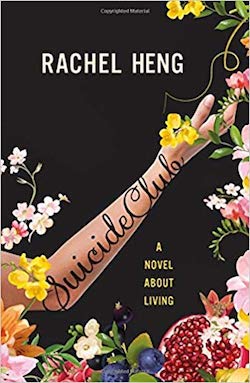A conversation with Rachel Heng about dystopia, death, and the marketability of a book titled "Suicide Club"

Last week at Elliott Bay Book Company, I interviewed Rachel Heng about her extraordinary debut novel, Suicide Club. Heng was a cheerful, generous interviewee — perhaps not what you'd expect from an author of a raw and intelligent sci-fi novel set in a dystopia that has conquered death. What follows is a lightly edited transcript of a portion of our conversation.
When I saw that your novel was titled Suicide Club, I could imagine hearing the Henry Holt marketing department's butt cheeks collectively clench at the thought of marketing the book. Seems like the word "suicide" might be a hard sell. Did they try to convince you to change the title at any point during the publication process?
Well, interesting story: At one point, I wanted to change the title, to Lifers. And they told me that was a terrible title. Well, they were more like, "oh, you should keep your original title." So actually, they were pretty on board with it from the beginning — they felt that it really got across the point of the book. I had my doubts, and for a while I had this other title that apparently sucked.
The book isn't dour or depressing, but it dwells in death and suicide. Was it challenging to keep your head in that space for an extended period of time?
I think my head is always in this space. I think the reason why I wrote the book was because I've always been quite preoccupied with death and loss. Everyone's had the experience where, when you were six or seven years old, you realize for the first time your parents are going to die. You're lying in bed in the middle of the night and you can't go to sleep and you're seized by this existential realization: 'my parents are going to die. What does that mean? I'm going to die at some point. Everyone I know will be dead and millions of people have died before me.'
And this is kind of something that stayed with me my entire life. I've spent lots of time thinking about it in what some people would call morbid ways. For me, it helps me appreciate my life better, always thinking of the fact that it's going to end.
So I think I wrote this book partly out of that fear. I don't think it was a difficult space to inhabit because it's something that I'm always inhabiting. And in a way, writing the book helped me address that — confront it face-on.
This is a dystopian novel, but it's very different than the dystopian fiction I've been reading lately. It's a different kind of doom. I thought before I read this book that I was suffering from dystopian fatigue, but your book feels completely different to me.
I didn't set out to write a sci-fi novel. And I think there's also this thing where, because of the Hunger Games, everyone assumes dystopian means [young adult fiction.] So when I started querying agents they were like, 'oh, this is YA,' and I'm like, 'do you see the title?'
I was kind of naive about the publishing industry. When you have a book coming out, you become hyperconscious of contemporary fiction and everything that's out there. But before that you're just kind of in your bowl and you have no idea what's coming out recently — you don't know about trends. I don't think I was super-aware of the whole dystopian trend until I was querying agents, and I read an interview with an agent who said 'dystopian fiction is so over,' and I was like, 'shit.'
I read a lot of dystopian fiction, but the older stuff. Brave New World was one of the most formative books that I read when I was a teenager. I'm from Singapore originally, and so I grew up in a very dystopian world. I didn't realize that until I was talking to a reporter for the national newspaper in Singapore and she said, 'I see a lot of stuff in the book that is reminiscent of how our government runs things. Did you do on purpose? Is this a satire?'
And I didn't intend for it to be, but I think it's just because I grew up in that world. And in many ways, I think it drew a lot from books like Brave New World and Margaret Atwood. And then as I was writing, someone told me to read Kazuo Ishiguro's Never Let Me Go. People had drawn comparisons to that, but I hadn't read it previously. If anything, I think I under-read dystopian fiction.